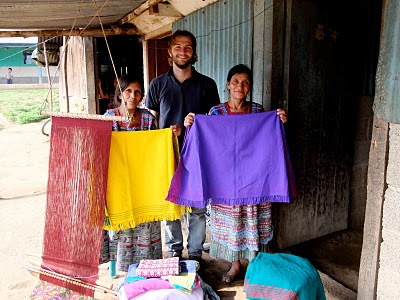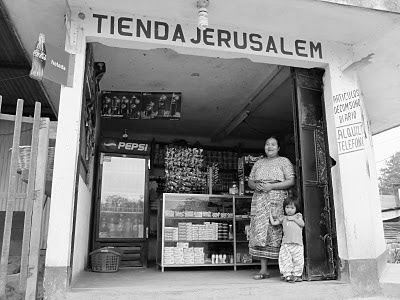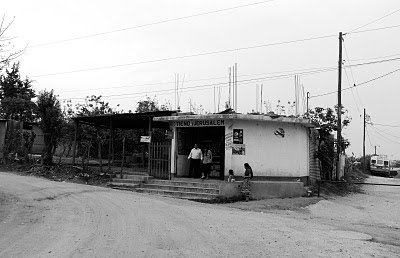San Cristobal - View from the Cathedral at sunset
I didn't really know what to expect going into Mexico, but I'd count that as a blessing.
If I'd brought my expectations with me based on my experiences in Monterrey, I think I would have been really misguided and unable to absorb the variety experiences that exist in a country as diverse in climate and culture as Mexico. I'm still patching together all the pieces of a county whose culture is a patchwork of micro-cultures all being pushed towards a similar identity that often lacks a resemblance to the actual people.
When I started heading East from Puerto Escondido to Zipolite, I was pushing further into a world warped by foreign hedonistic desires matched with local permissibility of anything that can fetch a price. Puerto Escondido has itself picked up a reputation as a hotspot for European tourists looking for hallucinogenic mushrooms and the bars that line the beach are known to stay open until sunrise as long as there are thirsty patrons. From the locals perspective, foreigners tend to be invading herds of loud, pink, sunburned, belligerents looking to do all the things that they couldn't get away with in their own countries.
You can even sense the resentment that pours down on you burning as strongly as the sun from those that aren't either directly involved in serving the tourists or completely ignoring their presence. One doesn't need to spend much time considering why. Most locals have never travelled further than a few towns away. All they know is the small patch of ground they call home. The other thing they know, is there seems to be an endless supply of white people who have loads of disposable money, most of which they only spend at businesses owned by foreigners when they aren't spending their time partaking in activities that generally offend the sensibilities of the local conservative catholic culture.
Saying the locals are pushed out of the standard tourist business such as lodging and food because they lack the trans-cultural experience necessary to understand the expectations and desires of the visitors, the other profitable sector that is protected against foreign operators is the drug trade. When foreigners come for hedonism and feel like there is no law stopping them, they often turn into steady market for all kinds of illicit substances. With the drugs, comes the drug dealers and their way of life that knows no moral limitations. With the drug dealers comes the crime and violence.
Now might be a good time to explain how I got my lip busted by a local lifeguard.
A recent acquaintance of mine, also named Mike, who is traveling over the next undetermined amount of time with a beard south, perhaps to Argentina, suggested we check out this one bar he saw. We walked down the street from our hostel about 50 yards and climbed the stairs up to the second story bar that was overlooking the indoor pool. We each ordered whatever domestic beer they had cold and I decided I'd buy a smoke to go with it. I asked the bartender if he had either Camel or Marlboro and he replied "Yeah, I've got Camels. 60 Pesos."
This is absurd. A pack of smokes costs about 30 Pesos in the last town I was in and maybe 35 Pesos here because of it's remoteness. "That's ridiculous, I'm not paying that. I'm going to one of the shops down the block" is how I replied to let him know I realized this was a game.
He seemed unshaken and replied with a grin, "All the other stores are closed, and I have cigarettes. Seems perfectly logical to me."
I wasn't going to let this shiester feel like he knew what he was doing so I let him know, "Your logic is crap. Now you have no business. I am going to borrow a cigarette from my friend. Nice negotiating."
Beyond the unpleasant barman, the crowd in the bar had "bad vibes" according to several other beachies who had walked in through out the night and thought there was a weird local crowd that seemed to be awfully hush in the corners. After our beers we headed out the door which is when we saw two blonde Danish girls in some sort of dispute with two local guys. Minding our own business we began to walk by. One of the girls began storming off in the same direction, but the other was still being pulled on by the locals. I decided I had to go back and ask, "Todo esta bien?"
The girl I could now see was clearly frightened and quite drunks asked me if I spoke English and then promptly asked me if me and my friend would help walk them somewhere away from these guys who were trying to forcibly if necessary drag them back to their apartment.
Instinctually I offered my elbow for her to hang on to and we walked the two of them back to "A Nice Place on the Beach", the bar attached to our hostel where there is always a safe number of friendly people and a lot of long term expats hang out ranging in age from 40 to 60 years old.
We sat the two of them down at the bar so they could essentially be in the center of the whole crowd and feel the sense of security of being surrounded by 25 people who spoke a familiar language. I sat down last and began to order a beer when I got a tap on the back of my right shoulder.
When I spun around I found who I later discovered was Oso, the local lifeguard. Except I only knew him as this point in time as a Mexican who had a look of rage on his face like his mother was just run down in the street by a mad bus, and also as one of the locals how had been so intently pulling on the young intoxicated blonde girls trying to get them somewhere private.
Oso - The rapist drug dealing lifeguard
I knew to seek a reconciliatory tone so I began hold open palms in front of me as I started, "Hey man, the girls are just really drunk and got scared for some reason. No hard feelings man."
Before I got half those words out of my mouth, they were replaced with a clenched fist flashing before my eyes and then pain and blood burst from my face. I staggered back trying to back into an area where I'd be more surrounded by the travelers I'd come to know, but by the time my vision cleared and I scanned the crowd to see where my attacker was, he was gone.
He came in so quickly, so quietly, and never said a word, that nobody even noticed I got punched. Suddenly everyone was looking at me holding my face with blood running down my beard and hands asking what had happened. Only one girl working behind the bar was actually facing out to the beach instead of in towards the bar and saw me get hit in the face without provocation, a mere inches behind the backs of everybody I'd made quick friends with other the last day or so.
I spent the next half an hour trying to discover the depth of the wound and cleaning it out with some cheap local liquor the bar gave me and some antibiotic cream. When I made my way back to everybody, that's when I found out history of Oso and other guys of his cut.
Oso is rumored to have tried to swim across the US border smuggling unknown quantities of cocaine and likes to take advantage of young girls who fall for their fantasy of an exotic hard bodied, dark skinned boy, with rippling muscles, a beach way of life, and local prestige. Exotic fantasy often turns to alarm when they make the mistake of having too much to drink with people they shouldn't trust. I've been told he might have 7 or 8 kids in 7 or 8 different countries.
I got jacked in the face - because I got in the way of #9
When I woke up in the morning, still with a pounding headache, the first news I heard at the bar (which serves breakfast/lunch/dinner), was that the barman from the night before, the one with the horribly corrupt and unscrupulous business practices, he was assassinated about an hour and a half after I left the bar - shot in the back of the head over a bad drug deal. The bar was closed the rest of the time I was in Zipolite with flowers and candles laid at the entrance.
This is what foreign hedonism, backed up by greenbacks and euros does to a local populace that has little money and some among then that have no morals.
---------------------------------
Thankfully not everywhere is full of people looking for sin and sun....
Some people come looking for culture and cuisine - and it makes all the difference
---------------------------------
From Zipolite to San Cristobal and the border still in progress....


























